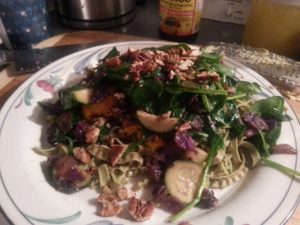Dressing Up Humble Red Cabbage

I usually have a plan for dinner. After all, I’m a Virgo with four planets in Virgo. We tend to details. But I didn’t have a plan last night, and when I got home at 6 p.m., ready to hunker down for a Carolina ice storm, what I really wanted to do was work out before cooking. So I quickly wrapped up some sweet potatoes and put them in the oven to bake, postponing my thoughts about the rest of the menu. Thirty minutes later I was finally ready to cook, but my menu was still an empty page.
As resourceful (or sometimes desperate) cooks often do, I opened the refrigerator door looking for inspiration. The red cabbage that had been ignored for a few days was calling my name. My first thought was to make a quick stir-fry, using cabbage as the focus since I didn’t have a lot of veggies on hand. But first I chopped an onion and placed it in a hot pan with ghee, since I like to cook onions for a good 15 minutes or more before adding other veggies. By giving onions a good head start they can become sweetly caramelized by the time the dish is complete. I put a pot of water on the stove to bring it to a boil for gluten-free pasta. Lately I’ve been using a mung pasta, which has a neutral flavor that goes well with anything and is a good vegetarian protein. I added the cabbage to the onions with a little water to help it soften. Cabbage is notorious for causing intestinal gas, if you’ll forgive my candor, but it’s easier to digest when cooked until quite tender with spices.
It was only when I began slicing zucchini that it occurred to me this dish had the potential to transcend the reputation of a pedestrian stir-fry. Instead of serving the sweet potato as a side dish, as though an afterthought, why not make it central to the plate? So while the cabbage was softening, I took the potatoes out of the oven, pulled off their skins and mashed them with a little ghee and salt. When the cabbage looked perfect, I added cumin, coriander and lots of fresh ginger for flavor. I put the pasta into its boiling cauldron and added the zucchini to the stir-fry. In the final minutes I added a few big handfuls of spinach to the stir-fry (wishing it were arugula) so that it would wilt by the time I was ready to assemble all the food.
Now for the fun! I loaded two plates by layers. The first layer was pasta, which I topped with a heaping portion of sweet potatoes. Then I piled on the veggies and sprinkled them with some chopped pecans to complement the sweet potatoes. Suddenly a mundane meal had been transformed into a minor culinary event! The ice storm never arrived, thankfully, but much to my surprise Annapurna had come to work in my kitchen.
Vata types have trouble digesting cabbage, but sweet potatoes, zucchini and the spices are all very grounding for vata, bringing this dish more into balance for the vata nature if eaten on occasion. Asafetida (also called hing) is used by Ayurvedic cooks to help prevent flatulence. Sorry to speak of such things in a food blog, but this is the truth! Enjoy this Red Cabbage Stir-Fry!






He doesn’t care for okra? How could this be? Your recipe sounds and looks great!
Thanks, Betsy! He’s not a Southerner! And his love of Indian cuisine didn’t translate to “ladies’ fingers.”